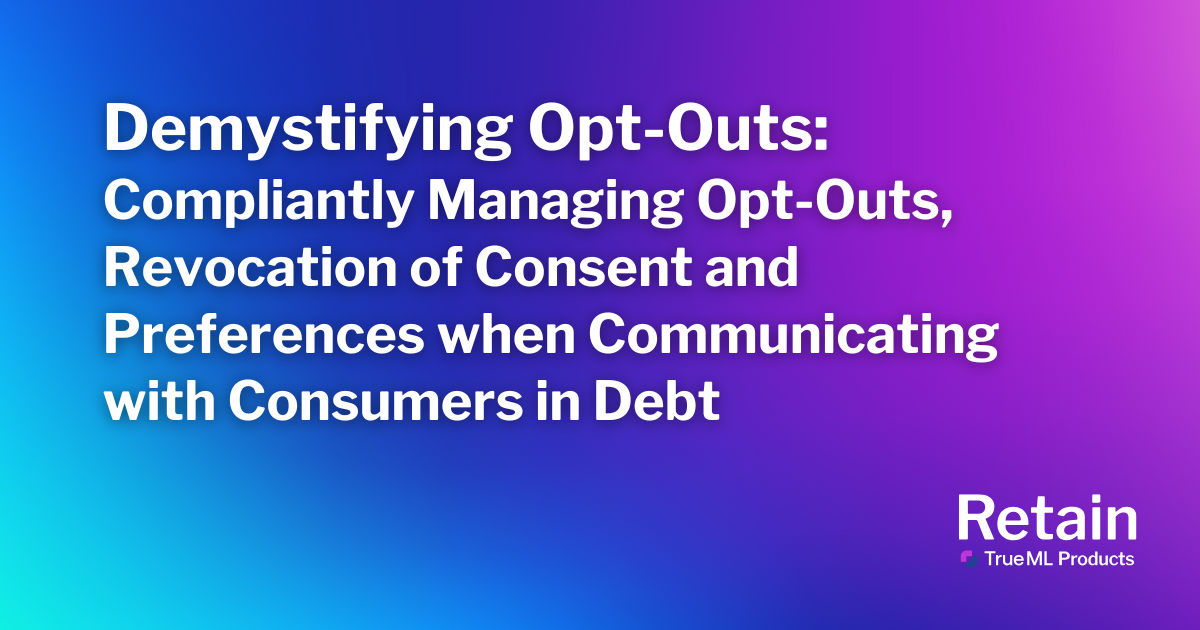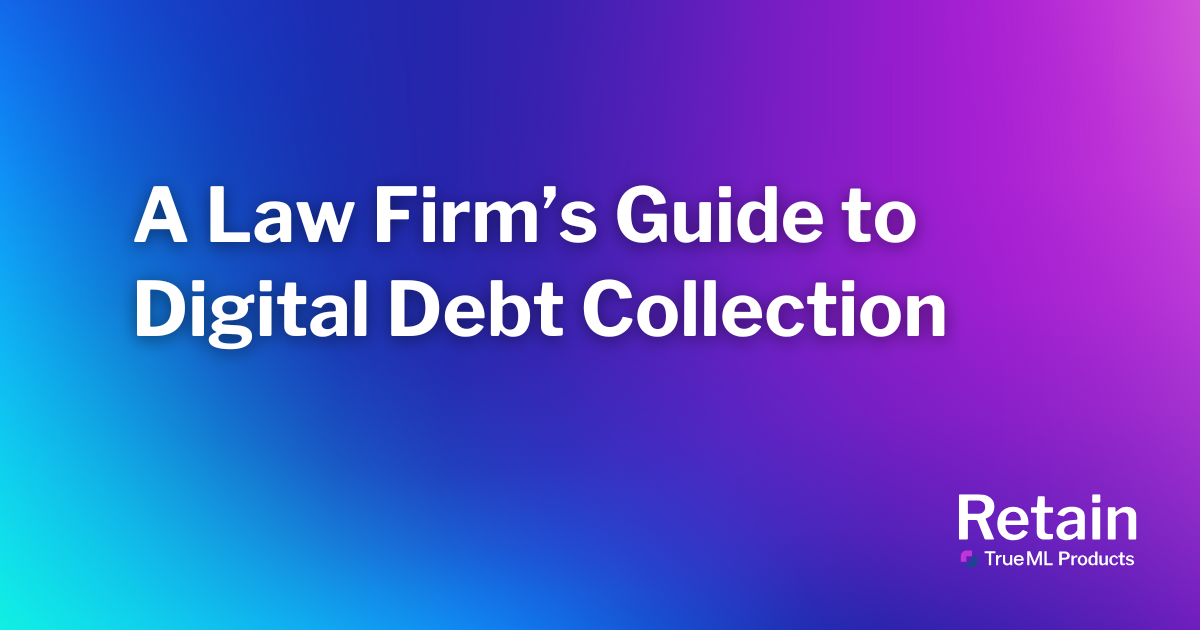Navigating consumer communication preferences and legal requirements for debt collection can be complex. In two related blog posts—The MailBox Rule Applies to Emails and Demystifying Consent: How to Compliantly Send Digital Debt Collection Communications to Consumers—we explained that under the law consent is not generally required for debt collection emails and text messages1 with a few exceptions under state laws (New York and Washington, DC) and particular use cases (sending required snail-mail communications digitally—like payment reminders and debt validation documents).
However, even if consent is not required for a particular debt collection communication, a consumer may choose to opt-out of communicating in that channel about their account. Failure to have proper internal treatment is very likely to result in an inability to send digital communications at all.
This blog post focuses on a company’s obligations when a consumer requests not to receive communications in a particular channel which, depending on the channel, may be an opt-out, a revocation of consent, a general communication preference, or all three.2
- An opt-out occurs when a consumer states they no longer wish to receive communications about their account through a specific channel.
- Revocation of consent involves a consumer withdrawing previously granted consent to communicate about an account in a particular channel. This is significant because consent is only required in limited circumstances, primarily concerning automated calls, texts, prerecorded or artificial voice calls, and certain email communications.
- A communication preference is a consumer expressing preferred or inconvenient modes of communication regarding their debt. While consumers may state preferences, recent court cases suggest debt collectors are not always obligated to honor specific preferences.
Understanding the nuances of an opt-out, revocation of consent, or general communication preferences is crucial for compliant operations. A debt collector needs comprehensive policies and processes to identify and honor requests to avoid when applicable Fair Debt Collection Practices Act (FDCPA) or Telephone Communication Practices Act (TCPA) lawsuits, carrier or email service provider requirements, and perhaps most importantly frustrating consumers.
1. Generally, an opt-out requires no longer using the channel (email, text, call, letter) to communicate with the consumer about the account.
Opt-outs should be honored, first and foremost, to honor a consumer’s request and avoid annoying or frustrating consumers. Failing to honor an opt-out could also be considered a violation of the FDCPA’s prohibition on harassment when a debt collector continues to communicate about an account in a channel after receiving an opt-out. While legal compliance is top of mind for any company, when it comes to successfully sending communications a business must follow the rules set up by the telecommunication providers or messages will be blocked and not delivered at all.
Telephone and email service providers require message senders to allow recipients to easily opt out of receiving texts and email messages. For example, the Cellular Telecommunications and Internet Association (CTIA) maintains the short code guidelines that companies texting using a short code must follow or have their code revoked. Keywords like “STOP,” “END,” “CANCEL,” “UNSUBSCRIBE,” or “QUIT” must be honored, with a confirmation message acknowledging the opt-out. Additionally, each carrier can make additional decisions related to short codes such as T-Mobile’s ban on debt collection messages found in its Code of Conduct. Similarly, Email Service Providers (ESPs) Gmail and Yahoo have one-click unsubscribe requirements for bulk email senders. One click unsubscribe is a feature that allows consumers to click an unsubscribe button embedded directly within the email interface at the top of the message that automatically notifies the sender of the consumer’s opt-out.
Regulation F (the CFPB’s debt collection rule) mandates that all electronic communications include a clear and conspicuous statement describing a reasonable and simple opt-out method. Once a consumer opts-out, a debt collector cannot use a communication channel except in three limited circumstances:
- First, a debt collector can send a confirmation message of the opt-out can that is limited to confirming the opt-out has been received.
- Second, if a consumer initiates communication in a channel after having already opted out, a debt collector may respond once in that channel to the consumer’s request.
- Finally, communications are permitted if required by law.

2. If consent was required and received, then after revocation the channel (email, text, call) cannot be used to communicate with the consumer about the account.
Revoking consent means that at some point consent was required in order to send the communication, but that consent has since been rescinded. In debt collection, consent requirements are limited. For phone calls and texts, the TCPA necessitates consent for calls and texts made using an ATDS and for calls using automated or prerecorded voices. For email and text communications, the FDCPA requires consent to send a validation notice by email within five days of initial communication if the notice was not in the initial communication. Consent is also needed to send debt validation documents following a dispute. The Electronic Fund Transfer Act (EFTA) requires consent for payment reminder communications. Additionally, New York requires consent for debt collection emails, and Washington, D.C., requires consent for more than one email or text per week. In these specific instances, if the consumer provided consent and later revokes that consent, then the channel cannot be used to communicate further with the consumer about the account absent newly obtained consent.
For calls and texts made using an ATDS and for calls using automated or prerecorded voices, a recent FCC Order provided additional guidelines. One provision of the Order took effect last year, three of the rules take effect April 11, 2025. Text message senders may text a one-time revocation-confirmation message, which cannot include marketing or promotional information.3 The FCC Order provides that the message should ideally be sent within five minutes of receiving the revocation; anything longer requires the sender to show the delay in the revocation-confirmation was reasonable. If a consumer consented to multiple message categories, clarification can be requested about what types of messages the consumer is revoking, but all future communications must cease without an affirmative response.
Effective April 11, 2025, consumers can revoke consent for robocalls, texts, and prerecorded or automated voice calls through any reasonable manner. This means that companies cannot designate exclusive revocation methods. The Order includes the following as reasonable methods:
- Automated opt-out mechanisms on robocalls
- Standard responses like “stop” to texts
- Requests submitted via a website or phone number
The Order gives business a reasonable time to process revocations as long as the reasonable time does not exceed ten business days. This is critically important for businesses who are managing large numbers of revocations across multiple channels.
Perhaps most importantly for debt collectors, also taking effect April 11, 2025, the Order states that revocation applies to the phone number, not the channel, meaning a “STOP” received in response to a text should be processed to also stop autodialed calls.
Bottom line: if a consumer has a right to consent to communication in a particular channel, then the consumer has a right to revoke that consent. In the limited areas in debt collection where consent is required, debt collectors need to have processes in place to make sure that a revocation is honored and no further communications occur on the account after revocation unless it is a one-time revocation-confirmation text.
3. Consumer communicated preferences related to the channel of communication do not have to be honored.
A preference is not an opt-out or a revocation—it is an expression of a preferred way to communicate. While it may be a good idea to try to honor a consumer’s preference, sometimes it might not be feasible for a business to honor a consumer’s preference. Examples of a preference could include:
- “I prefer to communicate by text message”
- “Can you call me between the hours of 5-7PM”
- “It is only convenient to send validation documents by email”
First, the FDCPA prohibits communications at unusual times or places and presumes that it is inconvenient to contact a consumer between the hours of 8AM – 9PM, unless the consumer states otherwise. Regulation F added additional rules to the inconvenient time and place restrictions of the FDCPA—when determining the time zone of the consumer to ensure presumptively convenient hours are met, Regulation F explains that if there is conflicting information about a consumer’s location (an area code in California and a zip code in Virginia) should lead to assuming the consumer is in both locations.
Next, Regulation F states an email is considered sent at the time the debt collector sends it. However, at least one federal court declined to follow Regulation F, ultimately suggesting that an email is never inconvenient: see Quinn Davis v. TrueAccord, No. 1:23-cv-23590 (S.D. Fla. Nov. 20, 2024).
The rule also provides examples of specific preferences that should be honored like not contacting a consumer on certain days or at certain locations. However, courts have found there is no “inconvenient manner” of communication. See cases like Ford v. Midland, Kirk v. Credit Mgmt., L.P., and Marks v. Javitch Block LLC.4 The Court in Ford found that sending debt validation documents via postal mail, despite a consumer’s request for email, is not a violation of the FDCPA. Therefore, the company not honoring the consumer’s preference to receive debt validation documents by email did not violate the law.
This suggests that the types of preference requests often received by debt collectors are not required to be followed. Before setting up processes that do not follow a consumer’s preferences, companies should consider whether it is possible and/or lawful to accommodate the request.
Whether an opt-out, revocation of consent, or communication preference, companies should create clear policy statements defining each type including how each use case is processed. All workflows should match the policy and staff should be trained on the nuances. Finally, companies should make sure to have controls and monitoring in place to ensure your policies and processes are followed.
TrueML Products’ Retain solution is specifically designed so clients can meet all requirements necessary to deliver communications electronically. If you have questions about our product Retain, please feel free to fill out a consultation form here»»
*This blog is not legal advice. Legal advice must be tailored to the particular facts and circumstances of each unique matter.
Citations:
- Consent is required for autodialed text messages, text messages sent using an automated telephone dialing system as defined by the Telephone Consumer Protection Act. The TCPA defines an autodialer an “automatic telephone dialing system” as equipment that has the capacity to: (a) store or produce telephone numbers to be called, using a random or sequential number generator; and (b) dial such numbers.
- This article does not focus on requests to cease and desist communications, which under the FDCPA require the cessation of all communication across all channels. These include statements such as “I refuse to pay” and “Do not contact me again.”
- This portion of the order relating to a one-time revocation-confirmation became effective on April 4, 2024.
- Kirk v. Credit Mgmt., L.P., 2:23-cv-482 (M.D. Ala. Jun. 28, 2024); and Marks v. Javitch Block LLC, 1:23-cv-431 (E.D. Tex. Mar. 13, 2024).
Sources:



